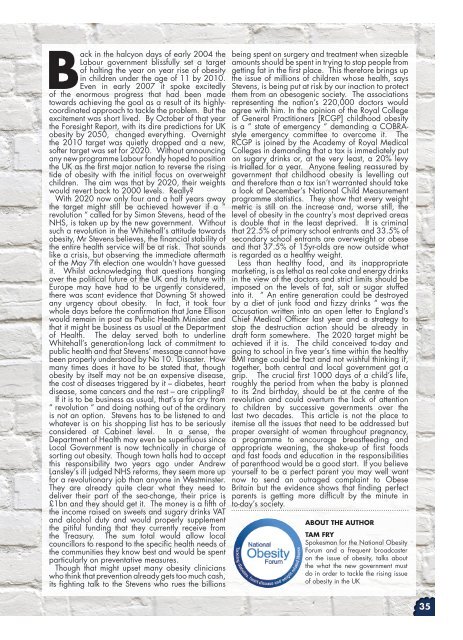Obese Britain Summer 2015.pdf
A magazine about Healthy Living, Weight Loss, Exercise and Dieting. Distributed with the Guardian on the 27th June 2015 www.obesebritain.com
A magazine about Healthy Living, Weight Loss, Exercise and Dieting. Distributed with the Guardian on the 27th June 2015 www.obesebritain.com
Create successful ePaper yourself
Turn your PDF publications into a flip-book with our unique Google optimized e-Paper software.
Back in the halcyon days of early 2004 the<br />
Labour government blissfully set a target<br />
of halting the year on year rise of obesity<br />
in children under the age of 11 by 2010.<br />
Even in early 2007 it spoke excitedly<br />
of the enormous progress that had been made<br />
towards achieving the goal as a result of its highlycoordinated<br />
approach to tackle the problem. But the<br />
excitement was short lived. By October of that year<br />
the Foresight Report, with its dire predictions for UK<br />
obesity by 2050, changed everything. Overnight<br />
the 2010 target was quietly dropped and a new,<br />
softer target was set for 2020. Without announcing<br />
any new programme Labour fondly hoped to position<br />
the UK as the first major nation to reverse the rising<br />
tide of obesity with the initial focus on overweight<br />
children. The aim was that by 2020, their weights<br />
would revert back to 2000 levels. Really?<br />
With 2020 now only four and a half years away<br />
the target might still be achieved however if a “<br />
revolution “ called for by Simon Stevens, head of the<br />
NHS, is taken up by the new government. Without<br />
such a revolution in the Whitehall’s attitude towards<br />
obesity, Mr Stevens believes, the financial stability of<br />
the entire health service will be at risk. That sounds<br />
like a crisis, but observing the immediate aftermath<br />
of the May 7th election one wouldn’t have guessed<br />
it. Whilst acknowledging that questions hanging<br />
over the political future of the UK and its future with<br />
Europe may have had to be urgently considered,<br />
there was scant evidence that Downing St showed<br />
any urgency about obesity. In fact, it took four<br />
whole days before the confirmation that Jane Ellison<br />
would remain in post as Public Health Minister and<br />
that it might be business as usual at the Department<br />
of Health. The delay served both to underline<br />
Whitehall’s generation-long lack of commitment to<br />
public health and that Stevens’ message cannot have<br />
been properly understood by No 10. Disaster. How<br />
many times does it have to be stated that, though<br />
obesity by itself may not be an expensive disease,<br />
the cost of diseases triggered by it – diabetes, heart<br />
disease, some cancers and the rest – are crippling?<br />
If it is to be business as usual, that’s a far cry from<br />
“ revolution “ and doing nothing out of the ordinary<br />
is not an option. Stevens has to be listened to and<br />
whatever is on his shopping list has to be seriously<br />
considered at Cabinet level. In a sense, the<br />
Department of Health may even be superfluous since<br />
Local Government is now technically in charge of<br />
sorting out obesity. Though town halls had to accept<br />
this responsibility two years ago under Andrew<br />
Lansley’s ill judged NHS reforms, they seem more up<br />
for a revolutionary job than anyone in Westminster.<br />
They are already quite clear what they need to<br />
deliver their part of the sea-change, their price is<br />
£1bn and they should get it. The money is a fifth of<br />
the income raised on sweets and sugary drinks VAT<br />
and alcohol duty and would properly supplement<br />
the pitiful funding that they currently receive from<br />
the Treasury. The sum total would allow local<br />
councillors to respond to the specific health needs of<br />
the communities they know best and would be spent<br />
particularly on preventative measures.<br />
Though that might upset many obesity clinicians<br />
who think that prevention already gets too much cash,<br />
its fighting talk to the Stevens who rues the billions<br />
being spent on surgery and treatment when sizeable<br />
amounts should be spent in trying to stop people from<br />
getting fat in the first place. This therefore brings up<br />
the issue of millions of children whose health, says<br />
Stevens, is being put at risk by our inaction to protect<br />
them from an obesogenic society. The associations<br />
representing the nation’s 220,000 doctors would<br />
agree with him. In the opinion of the Royal College<br />
of General Practitioners [RCGP] childhood obesity<br />
is a “ state of emergency “ demanding a COBRAstyle<br />
emergency committee to overcome it. The<br />
RCGP is joined by the Academy of Royal Medical<br />
Colleges in demanding that a tax is immediately put<br />
on sugary drinks or, at the very least, a 20% levy<br />
is trialled for a year. Anyone feeling reassured by<br />
government that childhood obesity is levelling out<br />
and therefore than a tax isn’t warranted should take<br />
a look at December’s National Child Measurement<br />
programme statistics. They show that every weight<br />
metric is still on the increase and, worse still, the<br />
level of obesity in the country’s most deprived areas<br />
is double that in the least deprived. It is criminal<br />
that 22.5% of primary school entrants and 33.5% of<br />
secondary school entrants are overweight or obese<br />
and that 37.5% of 15yr-olds are now outside what<br />
is regarded as a healthy weight.<br />
Less than healthy food, and its inappropriate<br />
marketing, is as lethal as real coke and energy drinks<br />
in the view of the doctors and strict limits should be<br />
imposed on the levels of fat, salt or sugar stuffed<br />
into it. “ An entire generation could be destroyed<br />
by a diet of junk food and fizzy drinks “ was the<br />
accusation written into an open letter to England’s<br />
Chief Medical Officer last year and a strategy to<br />
stop the destruction action should be already in<br />
draft form somewhere. The 2020 target might be<br />
achieved if it is. The child conceived to-day and<br />
going to school in five year’s time within the healthy<br />
BMI range could be fact and not wishful thinking if,<br />
together, both central and local government got a<br />
grip. The crucial first 1000 days of a child’s life,<br />
roughly the period from when the baby is planned<br />
to its 2nd birthday, should be at the centre of the<br />
revolution and could overturn the lack of attention<br />
to children by successive governments over the<br />
last two decades. This article is not the place to<br />
itemise all the issues that need to be addressed but<br />
proper oversight of women throughout pregnancy,<br />
a programme to encourage breastfeeding and<br />
appropriate weaning, the shake-up of first foods<br />
and fast foods and education in the responsibilities<br />
of parenthood would be a good start. If you believe<br />
yourself to be a perfect parent you may well want<br />
now to send an outraged complaint to <strong>Obese</strong><br />
<strong>Britain</strong> but the evidence shows that finding perfect<br />
parents is getting more difficult by the minute in<br />
to-day’s society.<br />
ABOUT THE AUTHOR<br />
TAM FRY<br />
Spokesman for the National Obesity<br />
Forum and a frequent broadcaster<br />
on the issue of obesity, talks about<br />
the what the new government must<br />
do in order to tackle the rising issue<br />
of obesity in the UK<br />
35



